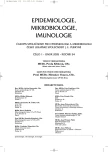-
Medical journals
- Career
HCV Genotyping by Combination of Cobas Amplicor HCV 2.0 Test and Versant HCV Genotype Assay
Authors: J. Němcová; V. Němeček
Authors‘ workplace: NRL pro virové hepatitidy, SZÚ Praha
Published in: Epidemiol. Mikrobiol. Imunol. 54, 2005, č. 1, s. 34-38
Overview
Genotyping of hepatitis C virus (HCV) is of relevance to scheduling the treatment of patients with chronic hepatitis C (VHC), making their prognosis and monitoring the treatment efficacy. A set of 62 sera testing HCV RNA positive in Cobas Amplicor HCV 2.0 test (CA) were genotyped using Versant HCV Genotype Assay (LiPA) Bayer, i.e. the reverse hybridization method, with the CA amplified product being directly used in the assay. Fifty-six out of 57 samples reactive in reverse hybridization (92 %) were genotyped. One sample showed a profile differing from any genotype, five samples were not reactive and one sample was not tested within this study design. Two out of five non-reactive sera and one non-tested serum could be genotyped by nested PCR based reverse hybridization. It can be concluded that the CA product resulting from one-step HCV RNA amplification is suitable for use in genotyping by reverse hybridization. The CA product based genotyping procedure is easier to perform, less time-consuming and less costly. The nested PCR based procedure could be used for typing of sera with lower HCV concentrations nontypeable with the combination of CA and Versant HCV Genotype Assay. Forty-eight selected samples were typed not only by reverse hybridization but also by a serological kit Murex HCV Serotyping 1–6 Assay (Abbot Murex). Thirty-seven (77 %) of these sera, including all of three sera negative in reverse hybridization, appeared typeable by this kit. Although less sensitive, serotyping may be of relevance to typing of sera with low HCV levels or not containing detectable viral NA which are nontypeable by reverse hybridization. Thirty-three sera appeared genotypeable by both of the methods tested with the results being in good agreement. In two cases only the serotyping method revealed one more type of virus (mixed genotype) compared to the reverse hybridization.
Key words:
HCV genotyping – reverse hybridization – serotyping.
Labels
Hygiene and epidemiology Medical virology Clinical microbiology
Article was published inEpidemiology, Microbiology, Immunology

2005 Issue 1-
All articles in this issue
- Disribution of Streptococcus pneumoniae Serotypes and Serogroups Among Patients with Invasive Pneumococcal Diseases in the Czech Republic in 1996–2003: Background Data for Vaccination Strategy
- Inhibition of Hemolytic Activity of Staphylococcus aureus β-hemolysin by an Exosubstance Produced by some Enterococcus faecalis Strains
- Poliomyelitis Surveillance in the Czech Republic from the Start of Vaccination to the Certification of Eradication in the European Region
- Longitudinal Epidemiology of Leptospirosis in the Czech Republic (1963–2003)
- A Questionnaire Study among General Practitioners: Experience with and Attitudes to Opioid Substitution Treatment
- HCV Genotyping by Combination of Cobas Amplicor HCV 2.0 Test and Versant HCV Genotype Assay
- Epidemiology, Microbiology, Immunology
- Journal archive
- Current issue
- Online only
- About the journal
Most read in this issue- Inhibition of Hemolytic Activity of Staphylococcus aureus β-hemolysin by an Exosubstance Produced by some Enterococcus faecalis Strains
- HCV Genotyping by Combination of Cobas Amplicor HCV 2.0 Test and Versant HCV Genotype Assay
- Longitudinal Epidemiology of Leptospirosis in the Czech Republic (1963–2003)
- Poliomyelitis Surveillance in the Czech Republic from the Start of Vaccination to the Certification of Eradication in the European Region
Login#ADS_BOTTOM_SCRIPTS#Forgotten passwordEnter the email address that you registered with. We will send you instructions on how to set a new password.
- Career

